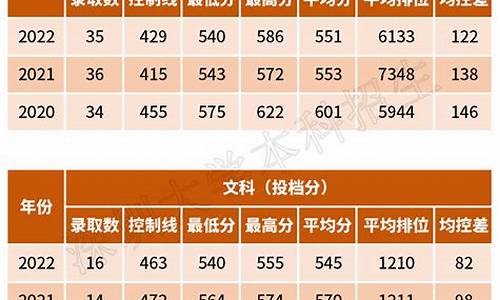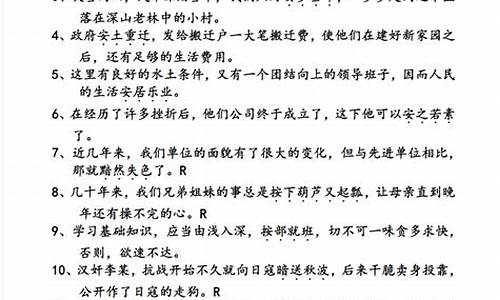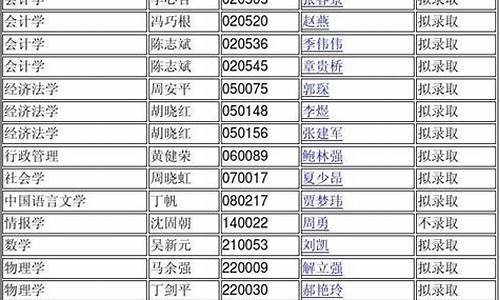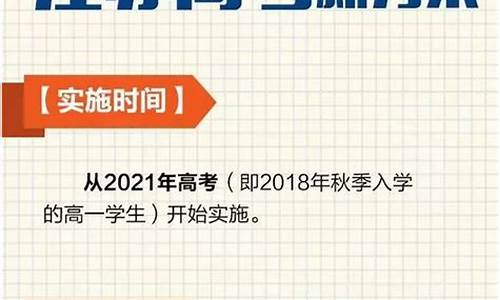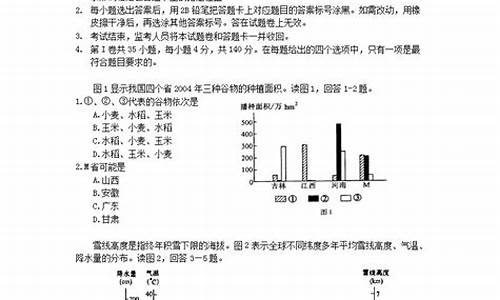2017年高考英语-英语2017高考答案新疆
1.金版教程2017英语答案
2.英语二2017年真题-阅读2-电子产品对于亲子的利弊
3.2017高考英语真题阅读理解总结
金版教程2017英语答案
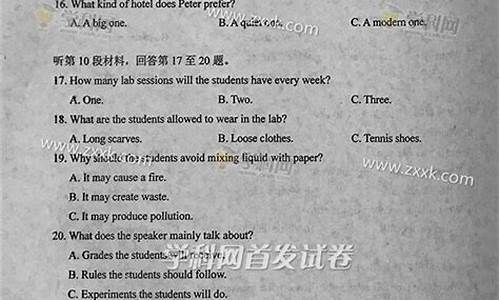
I. 1-5 BCACA
II. 1. themselves 2. himself 3. yourself 4. myself 5. herself
III. 1-5 BACCB 6-10 CBACA
IV. 1-5 CCBCA
V. One possible version:
The flu spreads easily among people. Weshould do our best to prevent it. Weshould go to bed early and get up early.We should also do some running. It’sgood for us to open the windows to let thefresh air in. We’d better not go tocrowded places. We must often clean ourhouses, wash hands, and change clothes.We should drink more boiled waterand eat healthy food.
英语二2017年真题-阅读2-电子产品对于亲子的利弊
Text 2
第1段
主旨:With so much focus on children’s use of screens, it’s easy for parents to forget about their own screen use. 由于对孩子使用屏幕的关注太多,家长们很容易忘记自己使用屏幕的情况。
例子“Tech is designed to really suck on you in,” says Jenny Radesky in her study of digital play, “and digital products are there to promote maximal engagement. It makes it hard to disengage, and leads to a lot of bleed-over into the family routine. ”
珍妮·雷德斯基(Jenny Radesky)在她对数字游戏的研究中表示:“科技的设计初衷是让你沉浸其中,而数字产品则是为了促进最大程度的参与。”这让人很难脱离,并导致家庭日常生活中出现很多流血事件。”
26.? According to Jenny Radesky , digital products are designed to _目的_____.据珍妮·雷德斯基所说,数码产品的设计目的是
[A] simplify routine matters 简化日常事务? × ? 干扰项? into the family routine
[B] absorb user attention 吸收用户的关注 原文:promote maximal engagement.
[C] better interpersonal relations 更好的人际关系 × 无
[D] increase work efficiency 提高工作效率? × 无
答案[B] absorb user attention
第2段:
例子Radesky has studied the use of mobile phones and tablets at mealtimes by giving mother-child pairs a food-testing exercise. 雷德斯基通过对母子进行食物测试,研究了手机和平板电脑在进餐时的使用情况。 ?
证明的观点She found that mothers who sued devices during the exercise started 20 percent fewer verbal and 39 percent fewer nonverbal interactions with their children.
她发现,在实验中使用电子设备的母亲开始与孩子进行的语言交流减少了20%,非语言交流减少了39%。
During a separate observation, she saw that phones became a source of tension in the family. Parents would be looking at their emails while the children would be making excited bids for their attention.
在另一次观察中,她发现手机成了家庭紧张的根源。家长们会看着他们的电子邮件,而孩子们则会兴奋地争取他们的关注。
27. Radesky’s food-testing exercise shows that mothers’ use of devices _ _____.例证找例外
雷德斯基的食品测试表明,母亲们使用电子设备————
[A] takes away babies’ appetite 夺走了婴儿的食欲? ×无
[B] distracts children’s attention 分散孩子的注意力? ×最后一句是干扰句 距离题眼句远,并且意思是孩子希望吸引父母注意力,主语也不一样
[C] slows down babies’ verbal development 减慢婴儿的语言发展?×无
[D] reduces mother-child communication 减少母子沟通? 原文替换:? interaction
答案[D] reduces mother-child communication
第3段
Infants are wired to look at parents’ faces to try to understand their world, and if those faces are blank and unresponsive—as they often are when absorbed in a device—it can be extremely disconcerting foe the children.
婴儿天生就喜欢看父母的脸,试图理解他们的世界,如果这些脸是空白的、没有反应的——就像他们在全神贯注于设备时经常看到的那样——这可能会让孩子极度不安。
例子Radesky cites the “still face experiment ” devised by developmental psychologist Ed Tronick in the 1970s.
Radesky引用了发展心理学家Ed Tronick在20世纪70年代设计的“静态脸实验”。
In it, a mother is asked to interact with her child in a normal way before putting on a blank expression and not giving them any visual social feedback; The child becomes increasingly distressed as she tries to capture her mother’s attention. 在这个实验中,一位母亲被要求以正常的方式与她的孩子互动,然后摆出一副茫然的表情,不给他们任何视觉上的社会反馈;当孩子试图引起母亲的注意时,她变得越来越痛苦。
观点?“ Parents don’t have to be exquisitely parents at all times, but there needs to be a balance and parents need to be responsive and sensitive to a child’s verbal or nonverbal expressions of an emotional need ,” says Radesky.
雷德斯基说:“父母不必在任何时候都表现得像个称职的父母,但这中间需要有一种平衡,父母需要对孩子情感需求的语言或非语言表达做出回应和敏感。”
28.? Radesky’s cites the “still face experiment” to show that _______.例证找例外
[A] it is easy for children to get used to blank expressions 孩子们很容易习惯空白的表情
[B] verbal expressions are unnecessary for emotional exchange 语言表达在情感交流中是不必要的
[C] children are insensitive to changes in their parents’ mood 孩子们对父母情绪的变化不敏感
[D] parents need to respond to children’s emotional needs 父母需要对孩子的情感需求作出反应
答案[D] parents need to respond to children’s emotional needs
第4段:
On the other hand, Tronick himself is concerned that the worries about kids’ use of screens are born out of an “ oppressive ideology that demands that ? parents should always be interacting ” with their children: “It’s based on a somewhat fantasized, very white, very upper-middle-class ideology that says if you’re failing to expose your child to 30,000 words you are neglecting them.”
另一方面,特罗尼克自己也担心,对孩子使用屏幕的担忧源于一种“压迫性意识形态,这种意识形态要求?的父母应该经常与孩子互动”:“它基于一种有点幻想的、非常白人化、非常中上层的意识形态,认为如果你不能让你的孩子接触到3万个单词,你就忽视了他们。”
Tronick believes that just because a child isn’t learning from the screen doesn’t mean there’s no value to it—particularly if it gives parents time to have a shower, do housework or simply have a break from their child.
特罗尼克认为,仅仅因为孩子没有从屏幕上学习,并不意味着它没有价值——尤其是如果它让父母有时间洗澡、做家务或只是暂时离开孩子休息一下。
Parents, he says, can get a lot out of using their devices to speak to a friend or get some work out of the way. This can make them feel happier, which lets then be more available to their child the rest of the time.
他说,父母们可以通过使用电子设备与朋友交谈或完成一些工作,从中获益良多。这能让他们感到更快乐,让他们在剩下的时间里有更多的时间陪伴孩子。
29. The oppressive ideology mentioned by Tronick requires parents to _______.
[A] protect kids from exposure to wild fantasies 保护孩子远离疯狂的幻想 × 无中生有 脑补
[B] teach their kids at least 30,000 words a year 每年至少教孩子3万个单词
[C] ensure constant interaction with their children? 确保经常与孩子互动 should always be interacting
[D] remain concerned about kid’s use of screens 仍然对孩子使用屏幕感到担忧
答案[C] 错因找错题眼句,被其他句子话干扰了,而且选项没有读准。interaction意思不知道。
30. According to Tronick, kid’s use of screens may _______.
[A] give their parents some free time 给他们的父母一些自由的时间
[B] make their parents more creative 让他们的父母更有创造力
[C] help them with their homework 帮助他们做家庭作业
[D] help them become more attentive 帮助他们变得更专注
答案[A] give their parents some free time
routine
disengage,
devices
appetite
separate observation
Infants
wired
exquisitely
oppressive
ideology
fantasized
attentive
2017高考英语真题阅读理解总结
阅读是外语学习者获取语言知识和提高语言能力的主要途径,阅读理 解能力是衡量学习者外语水平的重要指标。一起做一下阅读理解训练吧。下面是我为大家推荐的2017高考英语真题阅读理解总结,仅供大家参考!
2017高考英语真题阅读理解总结一
I found out one time that doing a favor for someone could get you into a lot of trouble. I was in the eighth grade at the time, and we were having a final test. During the test, the girl sitting next to me whispered something, but I didn?t understand. So I leaned over her way and found out that she was trying to ask me if I had an extra pen. She showed me that hers was out of ink and would not write. I happened to have an extra one, so I took it out of my pocket and put it on her desk.
Later, after the test papers had been turned in, the teacher asked me to stay in the room when all the other students were dismissed. As soon as we were alone she began to talk to me about what it meant to grow up; she talked about how important it was to stand on your own two feet and be responsible (负责任) for your own acts. For a long time, she talked about honesty and emphasized the fact that when people do something dishonest, they are really cheating themselves. She made me promise that I would think seriously about all the things she had said, and then she told me I could leave. I walked out of the room wondering why she had chosen to talk to me about all those things.
Later on, I found out that she thought I had cheated on the test. When she saw me lean over to talk to the girl next to me, it looked as if I was copying answers from the girl?s test paper. I tried to explain about the pen, but all she could say was it seemed very very strange to her that I hadn?t talked of anything about the pen the day she talked to me right after the test. Even if I tried to explain that I was just doing the girl a favor by letting her use my pen, I am sure she continued to believe that I had cheated on the test.
1. The story took place exactly ____ .
A. in the teacher?s office B. in an exam room
C. in the school D. in the language lab
2. The girl wanted to borrow a pen, because ____ .
A. she had not brought a pen with her B. she had lost her own on her way to school
C. there was something wrong with her wn D. her own had been taken away by someone
3. The teacher saw all this, so she asked the boy ____ .
A. to go on writing his paper B. to stop whispering
C. to leave the room immediately D. to stay behind after the exam
4. The thing(s) emphasized in her talk was(were) ____ .
A. honesty B. sense of duty C. seriousness D. all of the above
5. The boy knew everything ____ .
A. the moment he was asked to stay behind B. when the teacher started talking about honesty
C. only some time later D. when he was walking out of the room
I found out one time that doing a favor for someone could get you into a lot of trouble. I was in the eighth grade at the time, and we were having a final test. During the test, the girl sitting next to me whispered something, but I didn?t understand. So I leaned over her way and found out that she was trying to ask me if I had an extra pen. She showed me that hers was out of ink and would not write. I happened to have an extra one, so I took it out of my pocket and put it on her desk.
我发现一个时间,做一个人能给你带来很多麻烦。当时我在第八年级,我们有一个最后的考验。在测试期间,坐在我旁边的女孩低声说了些什么,但我不明白。我倚在她的方式,发现她想问我是否有额外的笔。她发现她是我的墨水用完,不会写。我碰巧有一个额外的,所以我把它从我的口袋里,放在她的办公桌上。
Later, after the test papers had been turned in, the teacher asked me to stay in the room when all the other students were dismissed. As soon as we were alone she began to talk to me about what it meant to grow up; she talked about how important it was to stand on your own two feet and be responsible (负责任) for your own acts. For a long time, she talked about honesty and emphasized the fact that when people do something dishonest, they are really cheating themselves. She made me promise that I would think seriously about all the things she had said, and then she told me I could leave. I walked out of the room wondering why she had chosen to talk to me about all those things.
后来,已经变成了试卷,老师让我呆在房间里时,所有其他的学生被开除。当我们单独在一起,她开始跟我谈什么是成长;她说,站在自己的两只脚,并负责是多么重要(负责任)为自己的行为。很长一段时间,她谈到诚实,并强调这一事实,当人们做一些不诚实的,他们真的欺骗自己。她让我保证,我会认真考虑所有的事情她说,然后她告诉我我可以离开。我走出房间问她为什么选择了跟我说所有这些事情。
Later on, I found out that she thought I had cheated on the test. When she saw me lean over to talk to the girl next to me, it looked as if I was copying answers from the girl?s test paper. I tried to explain about the pen, but all she could say was it seemed very very strange to her that I hadn?t talked of anything about the pen the day she talked to me right after the test. Even if I tried to explain that I was just doing the girl a favor by letting her use my pen, I am sure she continued to believe that I had cheated on the test.
后来,我发现她认为我在考试中作弊了。当她看到我瘦了跟我旁边的女孩,好像我是从复制的女孩的试卷答案。我试图解释的笔,但她可以说是它似乎非常奇怪,她说我还没有谈到任何关于笔的一天,她跟我就在考试后。即使我试图解释说我只是做女孩的忙,让她用我的笔,我相信她仍然认为,我在考试中作弊了。
2017高考英语真题阅读理解总结二
To be a good teacher, you need some of the gifts of a good actor; you must be able to hold the attention and interest of your audience; you must be a clear speaker, with a good, strong, pleasing voice which is fully under your control; and you must be able to act what you are teaching, in order to make its meaning clear.
Watch a good teacher, and you will see that he does not sit still before his class: he stands the whole time he is teaching; he walks about, using his arms, hands and fingers to help him in his explanations, and his face to express feelings. Listen to him, and you will hear the loudness, the quality (音色) and the musical note of his voice always changing according to what he is talking about.
The fact that a good teacher has some of the gifts of a good actor doesn?t mean that he will indeed be able to act well on the stage, for there are very important differences between the teacher?s work and the actor?s. The actor has to speak words which he has learnt by heart; he has to repeat exactly the same words each time he plays a certain part, even his movements and the ways in which he uses his voice are usually fixed beforehand (预先). What he has to do is to make all these carefully learnt words and actions seem natural on the stage.
A good teacher works in quite a different way. His audience takes an active part in his play: they ask and answer questions, they obey orders, and if they don?t understand something, they say so. The teacher therefore has to meet the needs of his audience, which is his class. He cannot learn his part by heart, but must invent it as he goes along.
I have known many teachers who were fine actors in class but were unable to take part in a stage-play because they could not keep strictly to what another had written.
1. What is the text about ?
A. How to become a good teacher.
B. What a good teacher should do outside the classroom.
C. What teachers and actors could learn from each other.
D. The similarities(相似处) and differences between a teacher?s work and an actor?s.
2. The word ?audience? in the fourth paragraph means ____ .
A. students B. people who watch a play
C. people who not on the stage D. people who listen to something
3. A good teacher ____ .
A. knows how to hold the interest of his students B. must have a good voice
C. knows how to act on the stage D. stands or sits still while teaching
4. In what way is a teacher?s work different from an actor?s ?
A. The teacher must learn everything by heart .
B. He knows how to control his voice better than an actor .
C. He has to deal with unexpected situations .
D. He has to use more facial expressions .
5. The main difference between students in class and a theatre audience is that ____.
A. students can move around in the classroom
B. students must keep silent while theatre audience needn?t
C. no memory work is needed for the students
D. the students must take part in their teachers? plays
6. Why is it that some good teachers are unable to play well on the stage ?
A. Nobody has taught them how to act on the stage .
B. Their audiences are different .
C. It is impossible for them to do so much memory work .
D. They are not used to repeating exactly the same words .
7. Which of the following is true ?
A. Teachers have to learn by heart what they are going to say in class .
B. A teacher cannot decide beforehand what exactly he is going to say in class .
C. A teacher must speak louder than an actor .
D. A teacher must have a better memory than an actor .
To be a good teacher, you need some of the gifts of a good actor; you must be able to hold the attention and interest of your audience; you must be a clear speaker, with a good, strong, pleasing voice which is fully under your control; and you must be able to act what you are teaching, in order to make its meaning clear.
要成为一个好老师,你需要一些好演员的天赋;你必须能够抓住观众的注意力和兴趣;你必须是一个明确的扬声器,具有良好的,强有力的,悦耳的声音完全在你的控制之下;你必须能够按照你的教学,以明确其含义。
Watch a good teacher, and you will see that he does not sit still before his class: he stands the whole time he is teaching; he walks about, using his arms, hands and fingers to help him in his explanations, and his face to express feelings. Listen to him, and you will hear the loudness, the quality (音色) and the musical note of his voice always changing according to what he is talking about.
看一个好老师,你会看到,他不坐他的课前,他代表整个时间他是教学;他走,用他的胳膊,手和手指来帮助他解释,他的脸表达感情。听他的,你会听到声音,质量(音色)和音乐注意到他的声音总是按照他所说的。
The fact that a good teacher has some of the gifts of a good actor doesn?t mean that he will indeed be able to act well on the stage, for there are very important differences between the teacher?s work and the actor?s. The actor has to speak words which he has learnt by heart; he has to repeat exactly the same words each time he plays a certain part, even his movements and the ways in which he uses his voice are usually fixed beforehand (预先). What he has to do is to make all these carefully learnt words and actions seem natural on the stage.
事实上,一个好老师有一些好演员并不意味着礼物,他一定能够在舞台上表演好,有教师和演员的工作的。他说的话他熟记于心的很重要的差别;他必须准确地重复同样的话每次他扮演某个角色,甚至他的动作,他用自己的发音方式都是事先确定的(预先)。他所要做的是让这些用心学习的言语和行动似乎自然的舞台上。
A good teacher works in quite a different way. His audience takes an active part in his play: they ask and answer questions, they obey orders, and if they don?t understand something, they say so. The teacher therefore has to meet the needs of his audience, which is his class. He cannot learn his part by heart, but must invent it as he goes along.
一个好老师的工作相当不同的方式。他的听众积极参与他的表演:他们提问和回答问题,他们服从命令,如果他们不理解的东西,他们这么说。老师必须满足听众的需要,这是他的学生。他不能了解他的心,但必须把它作为他走。
I have known many teachers who were fine actors in class but were unable to take part in a stage-play because they could not keep strictly to what another had written.
我知道有许多老师在课堂上是优秀的演员却不能在舞台上扮演角色,因为他们不能严格按照别人所写的。
2017高考英语真题阅读理解总结三
The Doctor?s Call
There was ice on the road, and the doctor?s car hit a tree and turned over three times. To his surprise, he was not hurt. He got out of the car and walked to the nearest house. He wanted to telephone the garage (汽车修理站) for help. The door was opened by one of his patients.
?Oh, Doctor.? she said, ?I have only just telephoned you. You must have a very fast car. You have got here very quickly indeed. There has been a very bad accident (事故) in the road outside. I saw it through the window. I am sure the driver will need your help.?
1. Where was the doctor going in his car?
A. We don?t know. B. To a patient?s home.
C. To a garage. D. To his own home.
2. Which of the following was the cause of the accident?
A. Careless driving. B. A tree had fallen across the road.
C. A slippery (滑) road. D. There was a thick fog.
3. The doctor went to the house because
A. he knew one of his patients lived there.
B. he had received a call to go there.
C he wanted to use the telephone.
D. he was injured (受伤) and could walk no further.
4. Why did the woman patient telephone the doctor?
A. She needed medical treatment.
B. She believed somebody else needed a doctor.
C. To ask how quickly the doctor could come.
D. To ask whether the doctor was coming on his regular visit.
5. How did the woman feel on opening the door and seeing the doctor?
A. She had been expecting the doctor, but was surprised that he had come so quickly.
B. She had not expected the doctor and wondered why he had come.
C. She felt glad that the doctor was not hurt in the accident.
D. She was alarmed (惊慌) at seeing the doctor in a bad state after the accident.
6. Which of the following is the most likely reply the doctor gave the woman patient at the end
of the story?
A. ?Yes, he does need help-your help, not mine.?
B. ?Another accident? I?ve just had an accident myself!?
C. ?I got your call and rushed over. I hope I?m not too late.
D. ?I didn?t get your call. But I?m here and hope I can help.?
路上有冰,和医生的车撞上一棵树,翻了三倍。让他吃惊的是,他没有受伤。他下了车,走到最近的房子。他想打电话车库(汽车修理站)帮助。门被他的一个病人开。
?哦,医生。?她说,?我刚刚给你打电话。你必须有一个非常快的车。你有在这里的确很快。有一个非常坏的事故(事故)在道路以外。我透过窗户看见它。我相信司机会需要你的帮助。?
声明:本站所有文章资源内容,如无特殊说明或标注,均为采集网络资源。如若本站内容侵犯了原著者的合法权益,可联系本站删除。





